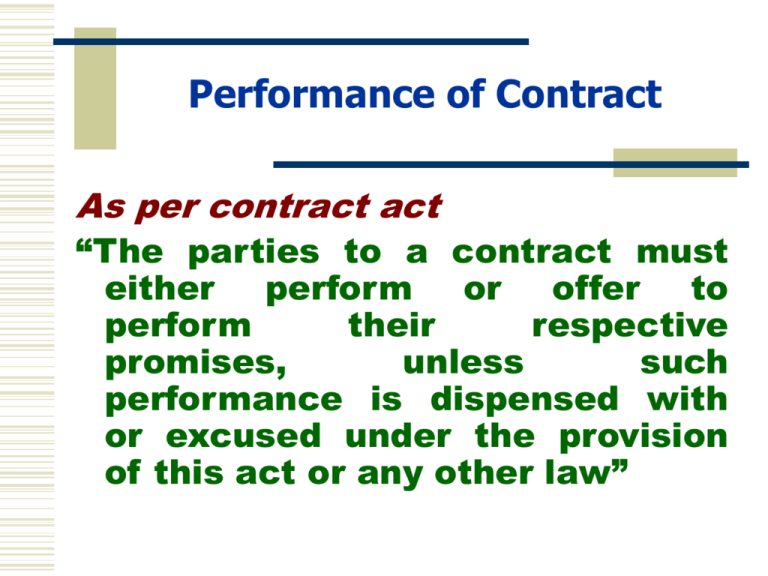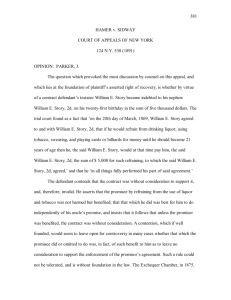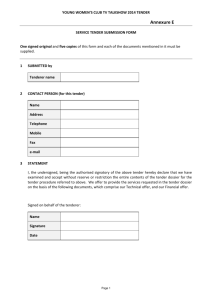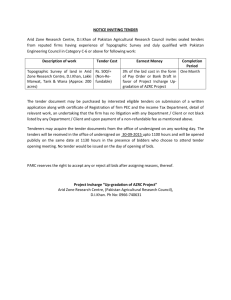Performance of Contract
advertisement

Performance of Contract As per contract act “The parties to a contract must either perform or offer to perform their respective promises, unless such performance is dispensed with or excused under the provision of this act or any other law” Performance of Contract A contract creates legal obligations. Performance of a contract means the carrying out of these obligation. Each party must perform or offer to perform the promise which he has made. The offer to perform or tender Tender : The offer to perform the contract is called tender. A offer to perform or tender to be legally valid, If it fulfils the following conditions: 1. It must be unconditional: Example: A passenger on a bus offers 100/=(one hundred) note for the fare. But actual fare is only 15/=. It is not a valid tender because it imposes condition on the acceptance of the tender. A tender of money must be of the exact amount due. The offer to perform or tender 2. A tender money must be in legal tender money, not be any foreign money, or promissory note or chaque. It will be legal country currency. The offer to perform or tender 3.Offer must be made at a proper time and place: The tender or offer to perform must be made at proper time and place. Proper time and place will depend upon the intention of the parties. A tender before the due date or at a time and place other than that agreed upon, is not a valid tender. The offer to perform or tender 4. The person to whom a tender is made must be given a reasonable opportunity of ascertaining that the person by whom it is made is able and willing there and then, to do the whole of what he is bound by his promise to do. The offer to perform or tender 5. An offer to perform a part of the promise is not a valid tender. 6. Reasonable opportunity to inspect. “If the offer is an offer to deliver anything to the promisee, the promisee must have a reasonable opportunity of seeing that the thing offered is the thing which the promisor is bound by his promise to deliver”. The offer to perform or tender 7. Offer in accordance of several promisee: If there are more than one promisee in a contract, then an offer to any one of them to perform the promise will be regarded as valid tender. Contract which need not be performed 1. If by mutual agreement there is Novation, Rescission or Alteration, the original contract need not be performed Novation Novation occurs when a new contract is substituted for an existing contract, either between the same parties or between the different parties. Alternation Alternation of a contract means change in one or more of the terms of a contract. it is valid if it is done with the consent of all the parties of the contract. In alternation there is change in the terms of the contract but no change of the parties of it. Rescission Rescission means cancellation of all or some of the terms or a contract. Waiver Waiver means the abandonment of right. A party of a contract may waive his rights under the contract. Thereupon the other party is released from his obligations. Merger When a superior right and an inferior right coincide and meet in one and the same person, the inferior right vanishes into the superior right. This is called merger. Remission Remission may be defined as the acceptance of less than what was contracted for. Every promisee may dispense with or remit wholly or in part, the performance of the promise made to him, or may extend the time for such performance, or may accept instead of it any satisfaction, which he thinks fit. Contract which need not be performed 4. If the promisee neglects or refuses to afford the promissory reasonable facilities for the performance of his promise the promisor is excused by such neglect or refusal as to any non performance caused thereby. Contract which need not be performed 2. The same rule applies in cases of remission. 3. When a voidable contract is rescinded, the other party need not perform his promise. Contract which need not be performed Under the Law of Contract the following agreements need not be performed. i) Unlawful consideration and contact. ii) Where the performance is unlawful and illegal. Effect of refusal to accept a properly made offer of performance or tender Where the promisor has made an offer of performance to the promisee and the offer has not been accepted, the contract is deemed to be broken by the promisee and he can be sued for breach of contract. Effect of refusal of party to perform promise wholly When a party to a contract has refused to perform, or disabled himself from performing his promise in its entirely, the promisee may put an end to the contract, unless he has signified by words or conduct, his acquiescence in its continuance. By whom is a contract to be performed 1. Personal performance 2. Performance by representative 3. Effect of performance from a third persons 4. Death of the promisor 5. Performance of joint promise. Who can demand performance ? 1. The promisee can demand performance of the promise. A stranger to a contract, i.e., one who is not a party to it. Cannot file a suit to enforce it. A contract between Kabir and Rahim can’t be enforced by Malek. 2. The legal representative can enforce of the contract upon the other party or parties and their legal representatives. Devolution of Joint Rights and Liabilities Joint Performance : Two or more persons may enter into a joint agreement with one or more persons. Example : A and B jointly promise to pay Tk. 5000 to C and D. In such cases, the question arises, who is liable to perform the contract and who can demand performance ? Devolution of Joint Rights and Liabilities 1. Devolution of joint liabilities 2. Any one of joint promisor may be compelled to perform i) Each promisor may compel contribution ii) Sharing of loss by default in contribution Devolution of Joint Rights and Liabilities Example : 1. A, B & C jointly promise to pay D Tk 12,000. D may compel either A or B or C to pay him the hole sum. 2. A, B & C jointly promise to pay D Tk 12,000. C is unable to pay anything and A is compelled to pay the hole. A is entitled to receive Tk. 6000 from B. Devolution of Joint Rights and Liabilities Example : 3. A, B & C jointly promise to pay D Tk 3000. C is compelled to pay the hole. A is insolvent but his assets are sufficient to pay one-half of his debts.C is entitled to receive Tk. 500 from A’s assets and 1250 from B. Devolution of Joint Rights and Liabilities 3. Effect of release of one joint promisor 4. Devolution of joint rights.




